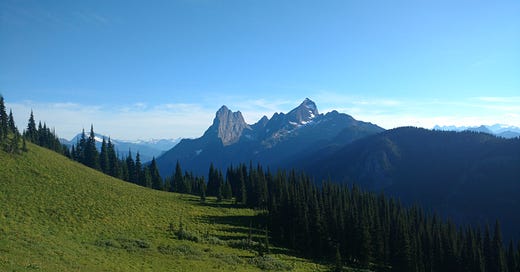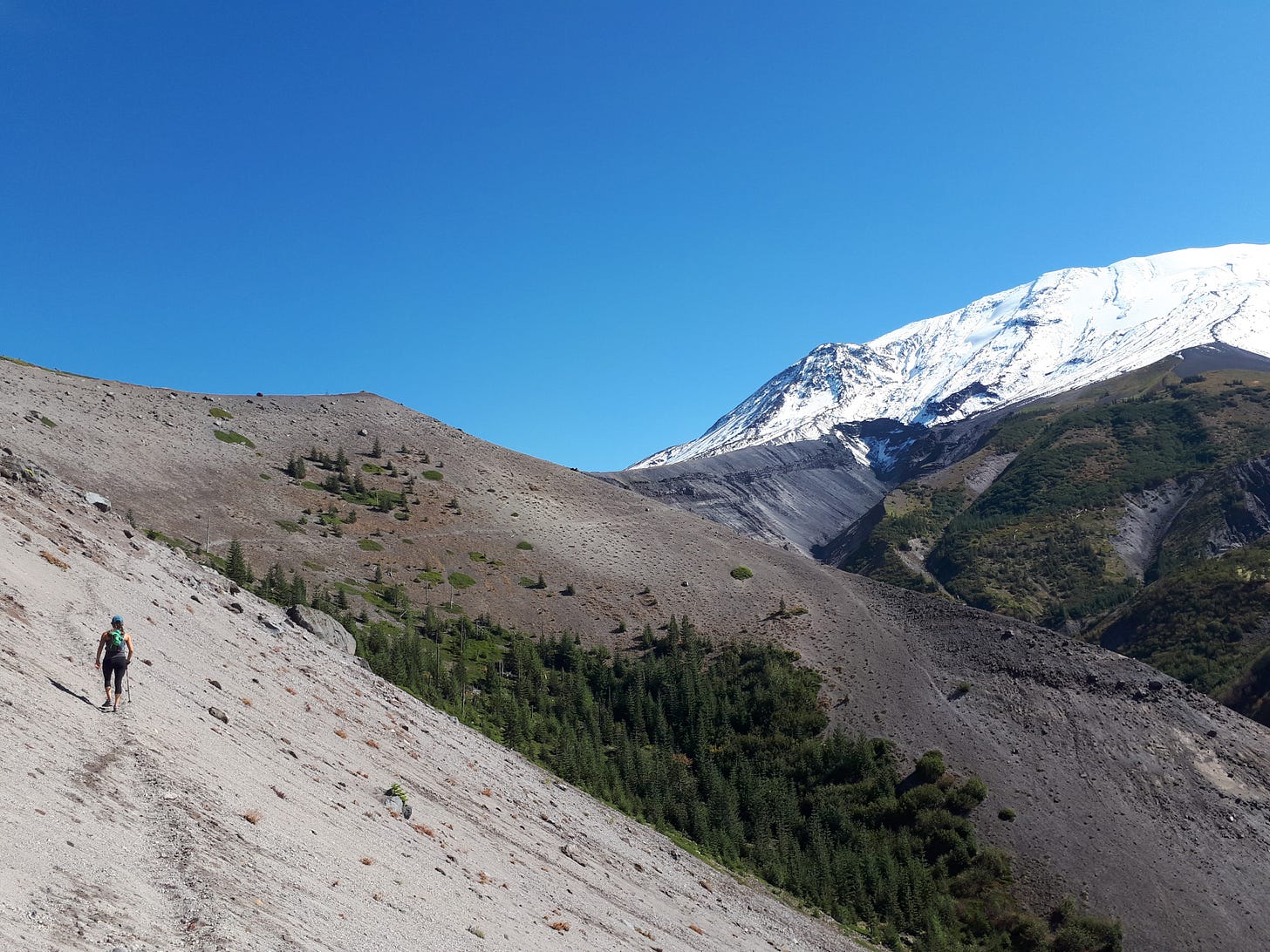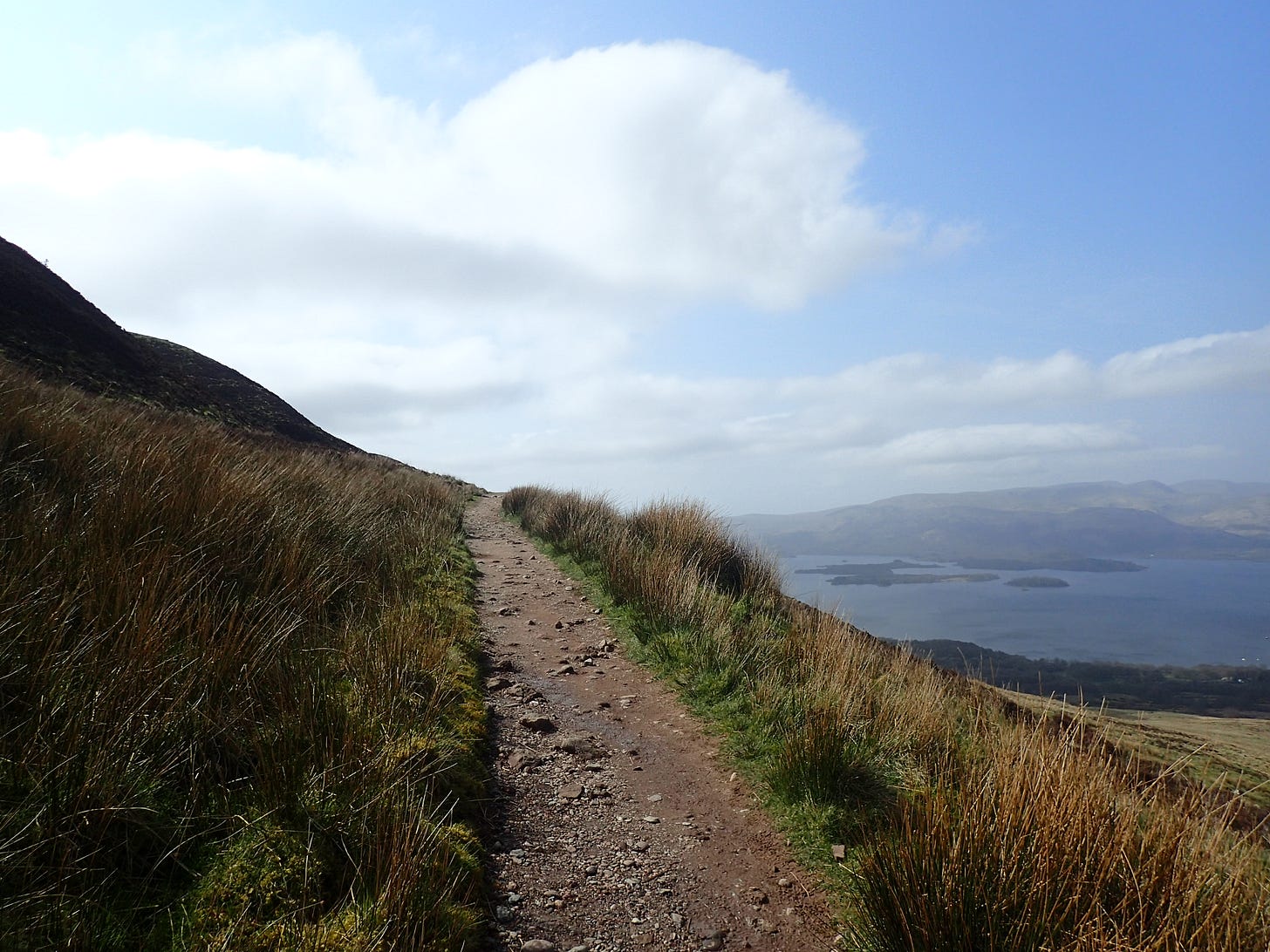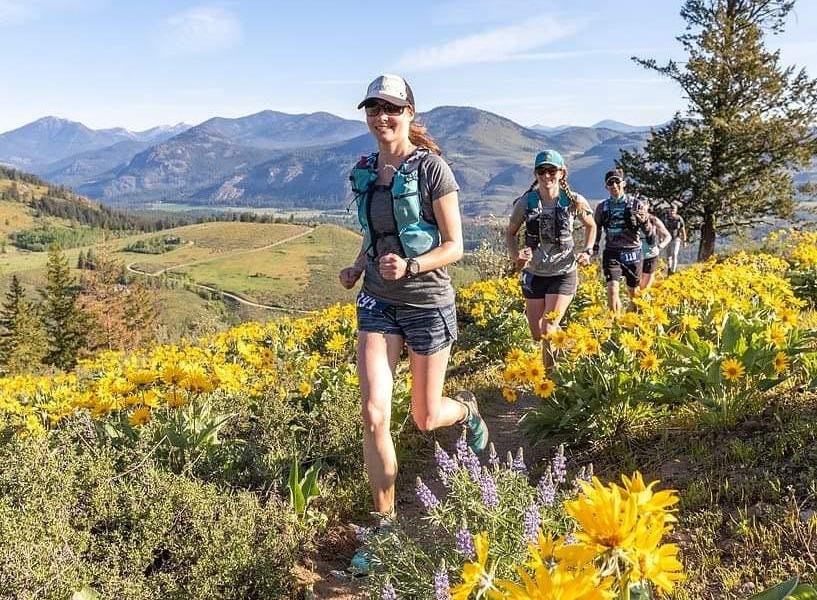Running wasn’t always a passion of mine. For most of my life, I’ve been a runner only because I am an impatient walker, so I would break into a jog on my way somewhere. My tiny, rural elementary/secondary school didn’t have things like track and field. We had the annual Milk Run, which most people casually strolled. One year I decided to sprint the five kilometers as fast as possible, collapsing into the grass at the end with my head spinning, feeling so accomplished.
It wasn’t until after university and some years of back-country skiing (which deserves its own love letter), that I started to appreciate running. Some of my ski friends were disappearing into the forest with tiny backpacks for hours or even days. At first, it sounded ridiculous but as I began to join in, I quickly became hooked. Trails that I’d previously loved to hike became whole new adventures. What surprised me is that it didn’t feel rushed - it just felt like so much more. We still had time to jump in lakes, enjoy views while sharing snacks, and maybe even bag some side peaks along the way. We’d emerge feeling trashed and fabulous with a day still left in the weekend to recover.
Trail running solo is like cheating at meditation. Instead of having to work to remove distracting thoughts, your brain just slides right into the present – completely in tune with the symphony of rocks and roots that you are dancing over. On days out with friends, we would carry a comfortable pace and have hours of conversation, talking over lives and goals, plans and fears, while the giant trees around us offered protection and comfort.
Spending long hours on the trails was transformative. It increased my understanding of my body’s capabilities and needs, and I also developed a stronger degree of self-assurance and comfort with discomfort. I felt possibility in everything - until July 2, 2022, when I finally got COVID. I haven’t been well since that day, and I can no longer run.
Now, if I stress my body, cascading symptoms will follow. Exercise has become poisonous. My chest feels tight all the time. I walk a fine line trying to stay as stable as I am, which I gratefully acknowledge is a far better baseline than where I’ve been. I’m luckier than many with Long COVID. I’m not bedridden or housebound. I can work, although it’s a challenge. My brain and nervous system feel like they’ve been hijacked, and my heart scares me. I’m self-employed, and nowhere near retirement.
Since I got sick, I’ve been to the hospital more than 20 times for CTs, MRIs, echos, a VQ scan, ultrasound, and a pile of cardio and respiratory function tests. I’ve had clotting issues that affected my teeth, and a pulmonary embolism. I’ve had stupid amounts of blood work done, so many EKGS, and multiple holter monitors. I’ve taken piles of medication, and recently developed a new arrhythmia which is driving me crazy. I’m currently waiting for an appointment with my fourth specialist.
I’m horrified at the burden this illness has added to an already strained healthcare system, and I’m equally horrified by what I’ve spent on experimental treatments, testing, and supplements.
The day of writing this marks exactly two years since I got COVID, and for some reason, I woke up thinking about running. My last run was pleasant. I was visiting Finland as my partner travels there for work, and while he was at the office I did a 20 km run-exploration of the city. It was my first time traveling since the pandemic started, and cases were low in Finland. It was a quiet and peaceful country to visit after prolonged isolation and Helsinki was beautiful to explore on foot. I had just purchased a new pair of Hokas for summer races that were finally on after several years of cancellations. Things were looking up. Unfortunately, the B5 wave was starting to surge in Europe, and I didn’t escape the flights home unscathed.
Sometimes I wonder if running played a role in contributing to my illness. Was I nutritionally depleted in some way? Did my cardiovascular system give the virus more efficient access to my organs? If running was a factor, it would have been just one of many. Research is showing indications of viral persistence and widespread impacts on patients. Combine a virus like SARS-COV-2 with our bodies’ complex individual life histories and genetics - a pure bad luck roll of the dice - and here we are.
I don’t feel athletic anymore, but at one of my stress tests, the facilitator commented that I had the heart of an athlete. She asked if I had been a hockey player. I told her I spent a lot of time in the mountains, but she didn’t seem impressed. She told me there shouldn’t be anything stopping me from returning to my normal activities. I couldn’t find the words to explain to her how far that was from the truth.
I don’t know if I’ll be capable of running again. After two years, it’s one of a long list of losses. My short-term goal of feeling well enough to handle daily life without feeling inflamed and overwhelmed, has turned into a long-term goal. But I have to remind myself that there have been real improvements. There have even been small improvements in my abilities to get into nature. If I rest enough first, I can pull off a little hike, but it’s not yet consequence-free. I’d love to be able to actually and predictably hike. I’d love to be able to carry a backpack while doing it. I’d love to be able to tolerate hills better, as there isn’t much flat hiking around here, and I miss the alpine. I still have to achieve many smaller goals before I get too caught up with these thoughts. Who knew taking it easy would be so hard.
For now, I have memories of all the time spent in the mountains - hiking, ski touring, and running. When I think of those memories, I feel sad, but also incredibly lucky that I got to experience them.
I remember driving down to Mt St Helens with Kate and sleeping in her van the night before running the Loowit trail. We did it in September and the day was stunning. A dusting of snow lay on the ground at the start, but full sunshine hit as we entered the meadows. We kicked off herds of running elk in front of us, while the slopes above were dotted with mountain goats. Every moment brought a different view as we circled the volcano. It will always be one of my favorite runs.
I remember my first official ultra, the Fat Dog 40 miler; where early on a fellow runner asked me what my planned pace was, and I had no idea. I think she figured I was being cagey, but I honestly had never yet worn a watch or thought about it before. At the aid station halfway through I was told I was in the lead for women, which means my pace was unwisely fast. I did not maintain that lead for long in the difficult second half of the race, but I still had a blast running through the meadows of Skyline Trail in Manning Park and heading down from the ridge just as the sun set. It was a perfect day.
I got to run 50 miles in the heat at Sun Mountain, and 50km in the cold at Orcas Island after an atmospheric river pounded down on us all night. I ran the 100-mile-long West Highland Way in Scotland over several days, feeling absolute freedom while covering so much changing landscape with endless sheep and friendly hikers to break the silence with.
With all of this running, I was never particularly fast or competitive. I didn’t race to win and I never did 100 mile distances in a single push. Maybe I would have worked my way up to that by now, or maybe not. I ran for the scenery, for the friendships, and because it was just so much fun.
If the memories are all I have, it’s a lot. But those memories also make me want to keep fighting to recover. Long COVID is insidious and destructive, and living it has made me feel deeply for everyone who has had to fight for their health while feeling at their worst, and it can get so much worse than what happened to me. It’s still hard to imagine living a long life this way, and I want to live. We need better protection from this virus, and we need real, effective treatments for Long COVID. I accept where I’m at now, but I will never give up on getting better.








A lovely piece. Thank you for writing it and sharing it.
Thank you Mary for identifying my pester: long covid.